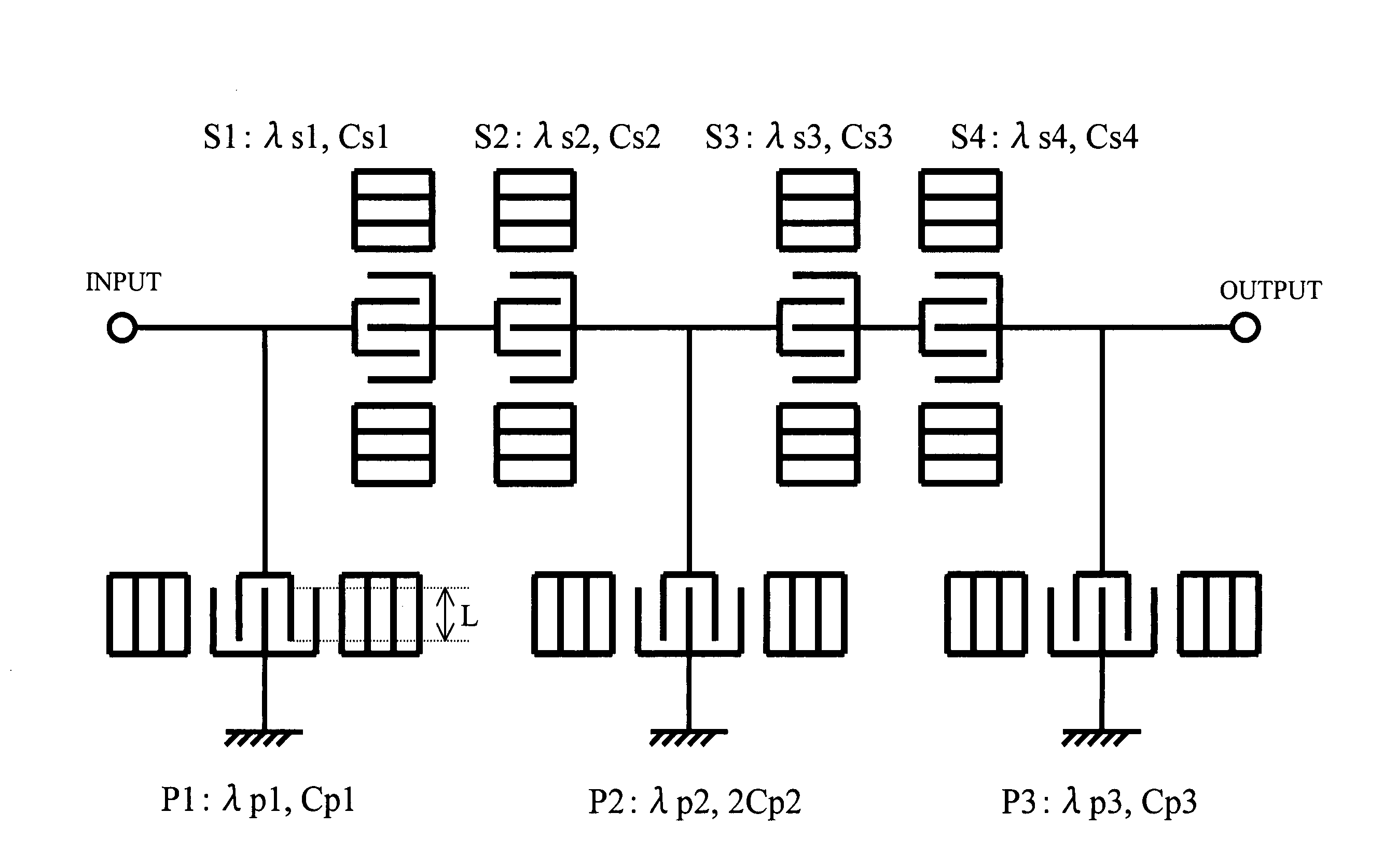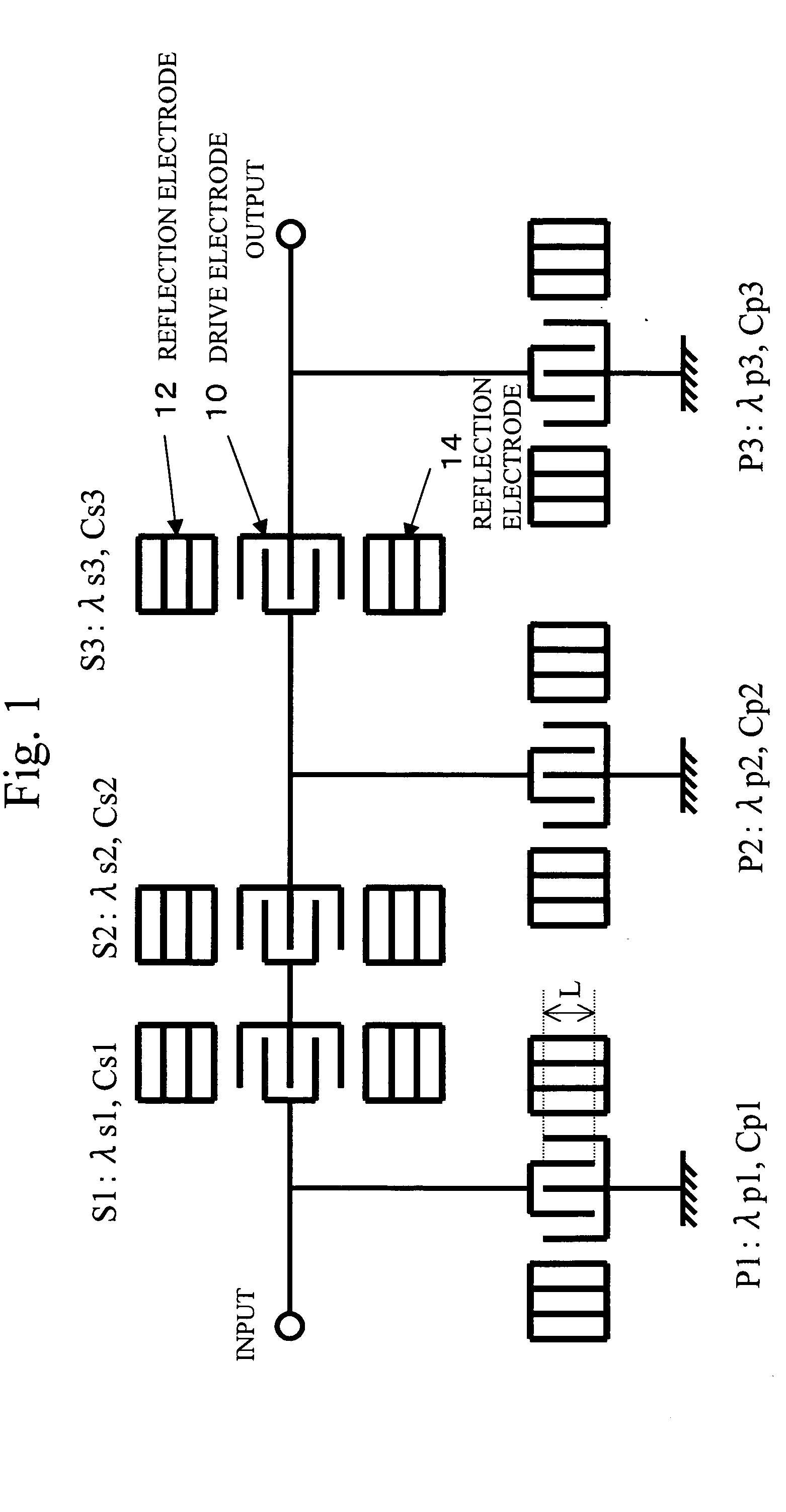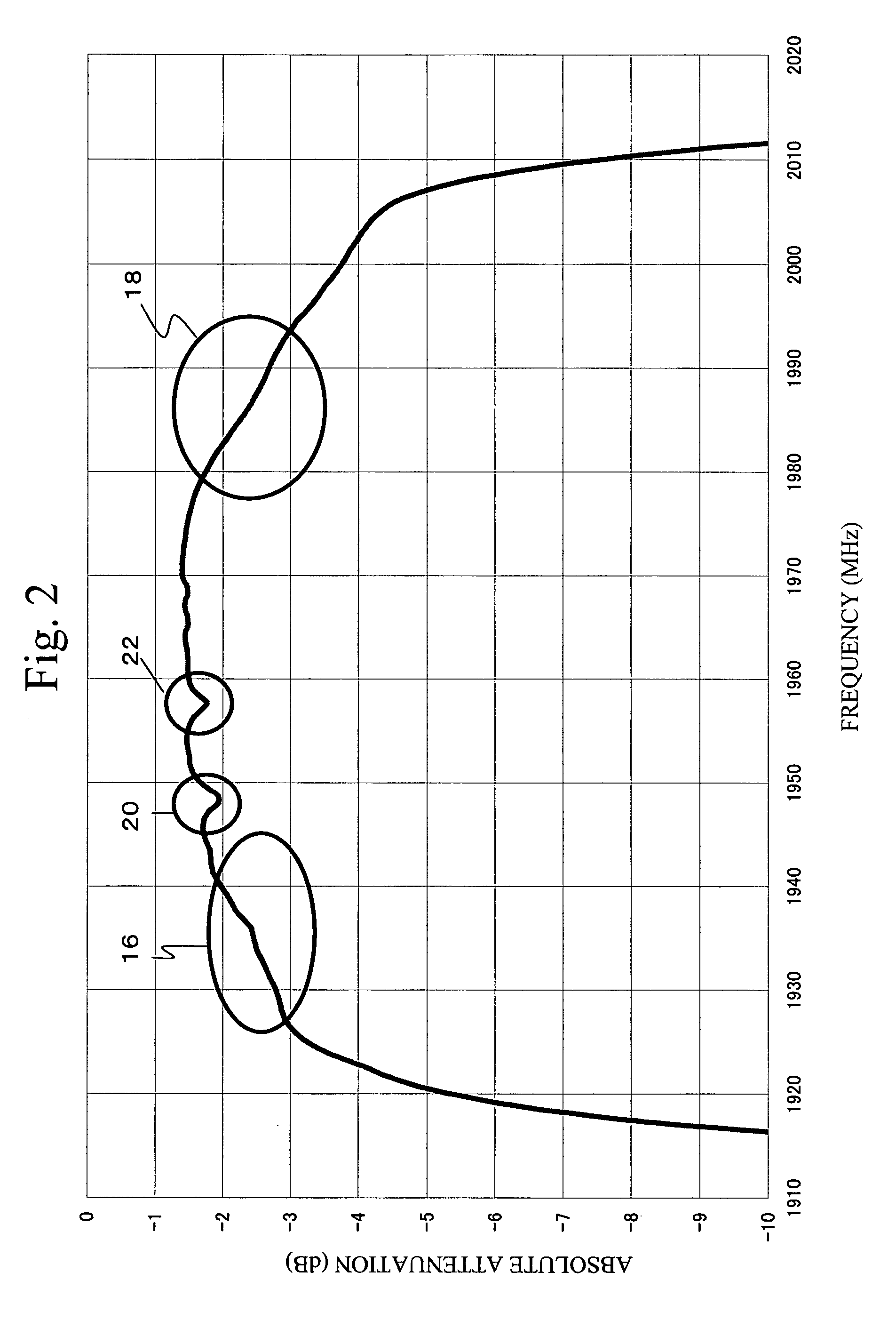Surface acoustic wave device
a surface acoustic wave and waveguide technology, applied in the direction of impedence networks, electrical devices, etc., can solve the problems ineffective prevention technique, ineffective prevention of increasing insertion etc., to improve insertion loss characteristics and shape factors, reduce insertion mismatching, and reduce loss at the edges of the pass band
- Summary
- Abstract
- Description
- Claims
- Application Information
AI Technical Summary
Benefits of technology
Problems solved by technology
Method used
Image
Examples
first embodiment
[0045] (First Embodiment)
[0046] A first embodiment of the present invention is as follows. As shown in FIG. 7, a ladder filter having resonators P1-S1-S2-P2-S3-S4-P3 connected in this order is formed with Al alloy on a piezoelectric substrate of 42° Y-X LiTaO3, so as to cope with a PCS reception filter (with a pass band of 1930 through 1990 MHz and an attenuation (transmission) band of 1850 through 1910 MHz). The parallel-arm resonator P1 has an IDT pitch λP1 of 2.024 μm, a reflection electrode pitch λrefP1 of 2.044 μm, an aperture length LP1 of 54.6 μm, and 20 pairs (NP1) of drive electrode fingers. The parallel-arm resonator P2 has an IDT pitch λP2 of 2.043 μm, a reflection electrode pitch λrefP2 of 2.063 μm, an aperture length LP2 of 83.8 μm, and 72 pairs (NP2) of drive electrode fingers. The parallel-arm resonator P3 has an IDT pitch λP3 of 2.018 μm, a reflection electrode pitch λrefP3 of 2.038 μm, an aperture length LP3 of 54.5 μm, and 20 pairs (NP3) of drive electrode fingers....
second embodiment
[0049] (Second Embodiment)
[0050] This embodiment is a filter with the same structure as the structure shown in FIG. 1. In this filter, the parallel-arm resonator P2 with the greatest electrostatic capacitance among the parallel-arm resonators P1 through P3 has the longest IDT pitch. The parallel-arm resonator P1 has an IDT pitch λP1 of 2.032 μm, a reflection electrode pitch λrefP1 of 2.052 μm, an aperture length LP1 of 54.9 μm, and 42 pairs (NP1) of drive electrode fingers. The parallel-arm resonator P2 has an IDT pitch λP2 of 2.040 μm, a reflection electrode pitch λrefP2 of 2.060 μm, an aperture length LP2 of 84.3 μm, and 84 pairs (NP2) of drive electrode fingers. The parallel-arm resonator P3 has an IDT pitch λP3 of 2.032 μm, a reflection electrode pitch λrefP3 of 2.052 μm, an aperture length LP3 of 54.9 μm, and 40 pairs (NP3) of drive electrode fingers. The series-arm resonators S1 and S2 each has an IDT pitch (λS1=λS2) of 1.952 μm, a reflection electrode pitch (λrefS1=ΔrefS2) of...
third embodiment
[0052] (Third Embodiment)
[0053] This embodiment is a filter with the same structure as the structure shown in FIG. 1. In this filter, the parallel-arm resonator P3 with the shortest IDT pitch among the parallel-arm resonators P1 through P3 has the smallest electrostatic capacitance. The parallel-arm resonator P1 has an IDT pitch λP1 of 2.032 μm, a reflection electrode pitch λrefP1 of 2.052 μm, an aperture length LP1 of 54.9 μm, and 42 pairs (NP1) of drive electrode fingers. The parallel-arm resonator P2 has an IDT pitch λP2 of 2.032 μm, a reflection electrode pitch λrefP2 of 2.052 μm, an aperture length LP2 of 84.0 μm, and 84 pairs (NP2) of drive electrode fingers. The parallel-arm resonator P3 has an IDT pitch λP3 of 2.022 μm, a reflection electrode pitch λrefP3 of 2.042 μm, an aperture length LP3 of 54.6 μm, and 40 pairs (NP3) of drive electrode fingers. The series-arm resonators S1 and S2 each has an IDT pitch (λS1=λS2) of 1.952 μm, a reflection electrode pitch (λrefS1=λrefS2) of...
PUM
 Login to View More
Login to View More Abstract
Description
Claims
Application Information
 Login to View More
Login to View More - R&D
- Intellectual Property
- Life Sciences
- Materials
- Tech Scout
- Unparalleled Data Quality
- Higher Quality Content
- 60% Fewer Hallucinations
Browse by: Latest US Patents, China's latest patents, Technical Efficacy Thesaurus, Application Domain, Technology Topic, Popular Technical Reports.
© 2025 PatSnap. All rights reserved.Legal|Privacy policy|Modern Slavery Act Transparency Statement|Sitemap|About US| Contact US: help@patsnap.com



